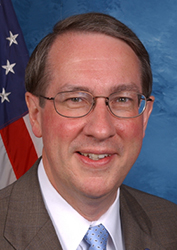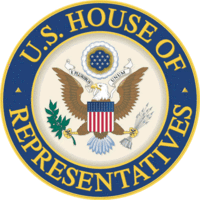 As we have previously reported, Rep. Goodlatte (R-VA), the Chairman of the House Committee on the Judiciary, introduced the "Innovation Act" (H.R. 3309) to curb abusive patent litigation, and conducted a hearing of his committee to address the merits of his bill. Last week, on November 20, 2013, the Judiciary committee "marked-up" the bill in a marathon session lasting several hours. However, other than a Manager's Amendment provided by Rep. Goodlatte (at right) the day before, and a few amendments introduced mainly by fellow Republicans, no additional changes were made to the bill despite the introduction of several amendments during the session. Most of these defeated amendments were introduced by Democrats on the committee, and they purported to address concerns that have articulated by stakeholders about the provisions in the bill. The sense of frustration experienced by these members of Congress can be summed up in the opening remarks of Rep. Watt (D-NC), who noted that "the problem we have now is not with non-practicing entities, but with NPLs, what I call non-practicing lawmakers who have crafted legislation without consideration of how the courtroom actually operates." Nevertheless, the bill was approved by the committee in a vote of 33-5, with the "nay" votes coming from Rep. Conyers (D-MI), Rep. Scott (D-VA), Rep. Watt, Rep. Jackson Lee (D-TX), and Rep. Johnson (D-GA). A copy of the marked-up bill can be found here. The House Committee on Rules will meet on Tuesday, December 3, 2013, to take up the matter, and any House member wishing to offer an amendment must do so be 4:00 pm, Monday, December 2. It is thought that the bill will be taken up by the House next week.
As we have previously reported, Rep. Goodlatte (R-VA), the Chairman of the House Committee on the Judiciary, introduced the "Innovation Act" (H.R. 3309) to curb abusive patent litigation, and conducted a hearing of his committee to address the merits of his bill. Last week, on November 20, 2013, the Judiciary committee "marked-up" the bill in a marathon session lasting several hours. However, other than a Manager's Amendment provided by Rep. Goodlatte (at right) the day before, and a few amendments introduced mainly by fellow Republicans, no additional changes were made to the bill despite the introduction of several amendments during the session. Most of these defeated amendments were introduced by Democrats on the committee, and they purported to address concerns that have articulated by stakeholders about the provisions in the bill. The sense of frustration experienced by these members of Congress can be summed up in the opening remarks of Rep. Watt (D-NC), who noted that "the problem we have now is not with non-practicing entities, but with NPLs, what I call non-practicing lawmakers who have crafted legislation without consideration of how the courtroom actually operates." Nevertheless, the bill was approved by the committee in a vote of 33-5, with the "nay" votes coming from Rep. Conyers (D-MI), Rep. Scott (D-VA), Rep. Watt, Rep. Jackson Lee (D-TX), and Rep. Johnson (D-GA). A copy of the marked-up bill can be found here. The House Committee on Rules will meet on Tuesday, December 3, 2013, to take up the matter, and any House member wishing to offer an amendment must do so be 4:00 pm, Monday, December 2. It is thought that the bill will be taken up by the House next week.
 For those keeping track of the various iterations of the bill, Rep. Goodlatte provided an explanation of the changes found in his Manager's Amendment. First, he explained that there were clarifications and edits to the provisions dealing with heighted pleading standards. In addition, he included changes to the joinder provision to ensure that this section is triggered when a party is unable to satisfy a fee-award pursuant to the new fee-shifting provisions. The amendments also included changes to the discovery reform section, providing courts with additional discretion to ensure that party cannot "reverse game" the system. Finally, Rep. Goodlatte explained that changes were made to various other sections to increase clarity, provide for greater discretion of the judicial conference, and comport with the recently introduced Leahy bill in the Senate. While these amendments certainly improve the language of the current bill, none of them address the underlying concerns that stakeholders have expressed about how the provisions in the bill will likely result in unintended consequences. Moreover, Rep. Goodlatte failed to highlight that his Manager's Amendment also did away with the proposed changes to the Covered Business Method Patent Reviews section of the America Invents Act ("AIA"). The original draft had sought to repeal the sunset provision and increase the scope of these reviews. Nevertheless, removal of this section appears to have received mixed reviews from the community.
For those keeping track of the various iterations of the bill, Rep. Goodlatte provided an explanation of the changes found in his Manager's Amendment. First, he explained that there were clarifications and edits to the provisions dealing with heighted pleading standards. In addition, he included changes to the joinder provision to ensure that this section is triggered when a party is unable to satisfy a fee-award pursuant to the new fee-shifting provisions. The amendments also included changes to the discovery reform section, providing courts with additional discretion to ensure that party cannot "reverse game" the system. Finally, Rep. Goodlatte explained that changes were made to various other sections to increase clarity, provide for greater discretion of the judicial conference, and comport with the recently introduced Leahy bill in the Senate. While these amendments certainly improve the language of the current bill, none of them address the underlying concerns that stakeholders have expressed about how the provisions in the bill will likely result in unintended consequences. Moreover, Rep. Goodlatte failed to highlight that his Manager's Amendment also did away with the proposed changes to the Covered Business Method Patent Reviews section of the America Invents Act ("AIA"). The original draft had sought to repeal the sunset provision and increase the scope of these reviews. Nevertheless, removal of this section appears to have received mixed reviews from the community.
The only other accepted amendment that required a roll-call vote was introduced by Rep. Jeffries (D-NY). This amendment changed the wording of the fee-shifting provision from an awarding of fees "unless the court finds that the position and conduct of the nonprevailing party or parties was substantially justified or that special circumstances make an award unjust," to "unless the court finds that the position and conduct of the nonprevailing party or parties were reasonable justified in law and fact or that special circumstances (such as severe economic hardship to a named inventor) make an award unjust" (emphasis added). This amendment passed with only two Representatives voting against it -- Rep. Conyers and Rep. Johnson. This certainly improves the provision, and would presumably give courts more discretion in shifting fees. However, it does not address the concerns of stakeholders that this essentially shifts U.S. patent litigation to a "loser pays" systems, barring a justification finding by the court. In fact, Rep. Watt attempted to introduce an amendment that would do just that, by amending the current § 285 Attorney fees provision to read: "The court in appropriate cases may award reasonable attorney fees to the prevailing party." This, of course, would have removed the "exceptional" language that has been thought to be the main barrier to the awarding of such fees. Unfortunately, the amendment of Rep. Watt failed by a margin of 12-23.
There were a few other amendments that were accepted by the committee that did not require a roll-call vote. First, Rep. Chaffetz (R-UT) offered a bipartisan amendment to include a "Sense of Congress" regarding demand letters. This provision provided that Congress has a "sense" that demand letters are getting out-of-hand. The provided remedy would prevent a patent holder from establishing willful infringement if did not have evidence of pre-suit notification, including particulars of the patents at issue and the accused products or processes. Despite opposition from members such as Rep. Conyers, who pointed out that the amendment appears to "punish plaintiffs . . . when they may not know all of the details of how the defendant infringes the patent," the amendment passed by voice vote. Rep. Marino (R-PA) proposed that the Director of the Patent Office study the issue of demand letters, and Rep. Issa (R-CA) proposed that the GAO study the issue of business method patent quality. Both of these amendments easily passed. The final amendment that passed by voice vote was introduced by Rep. Richmond (D-LA), and it included apparently non-controversial changes to address the protection of small businesses, minorities, and veterans.
The mark-up session took such a long time because amendments were introduced that would have removed or changed most of the provisions found in the "Innovation Act." Part of the problem that most of the Democrats appeared to have with the bill was that there had been insufficient time to obtain the input from stakeholders in the patent community. Rep. Goodlatte defended the bill, explaining that a "discussion draft of this bill was made available to everyone in the world in May of this year." However, the "discussion draft" was significantly different than the current bill, and did not contain many of the controversial provisions. For example, the section addressing attorney fees looked more like the amendment made by Rep. Watt referred to above than it did to the provision that made it into this bill. The Democrats complained that many of these provisions could result in unintended consequences, especially without a full vetting in the community. Ironically, Rep. Goodlatte spoke out in opposition to an amendment introduced by Rep. Marino addressing demand letter abuse by stating that "the nature of this project and patent reform in general has taught us that even small changes can have unintended consequences unless they have been vetted and gone through a careful process." Fortunately, Rep. Richmand (D-LA) and Rep. Watt called him out on this inconsistency. "There are a lot of unintended consequences that I hope the members will try to address, or help us address, if we haven't closed our minds about making this a better bill that we can coalesce behind," Rep. Watt said.
We will continue to monitor and report on the progress of this bill, and the equivalent bill that has been introduced by Sen. Leahy in the Senate.
For additional information regarding this and other related topics, please see:
• "The Futility of Petitioning Congress (After the Fix Is In): Stakeholders Tell Judiciary Committee What's Wrong with Goodlatte Bill (H.R. 3309)," November 21, 2013
• "Yet Another 'Patent-Troll' Bill – Senator Leahy Introduces Patent Transparency and Improvements Act," November 20, 2013
• "Trolls Better Watch Out This Halloween -- Senator Hatch Introduces Patent Litigation Integrity Act," October 30, 2013
• "House Judiciary Committee Holds Hearing on Innovation Act," October 29, 2013
• "Rep. Goodlatte Introduces "Innovation Act" to Combat Patent Trolls," October 23, 2013
• "Rep. Goodlatte Introduces Second 'Discussion Draft' of Legislation Aimed at Curbing 'Abusive Patent Litigation'," September 24, 2013
• "Coalition Opposes Expansion of AIA § 18," September 23, 2013
• "The War on Patent Trolls -- Congress Prepares for Battle," September 18, 2013
• "The GAO Issues a Report on Patent Litigation Trends -- It Turns Out that the Sky Is Not Falling," August 29, 2013
• "New Patent Litigation Bill Introduced in House," July 16, 2013
• "Congress Continues Efforts to 'Reform' U.S. Patent Law," June 10, 2013